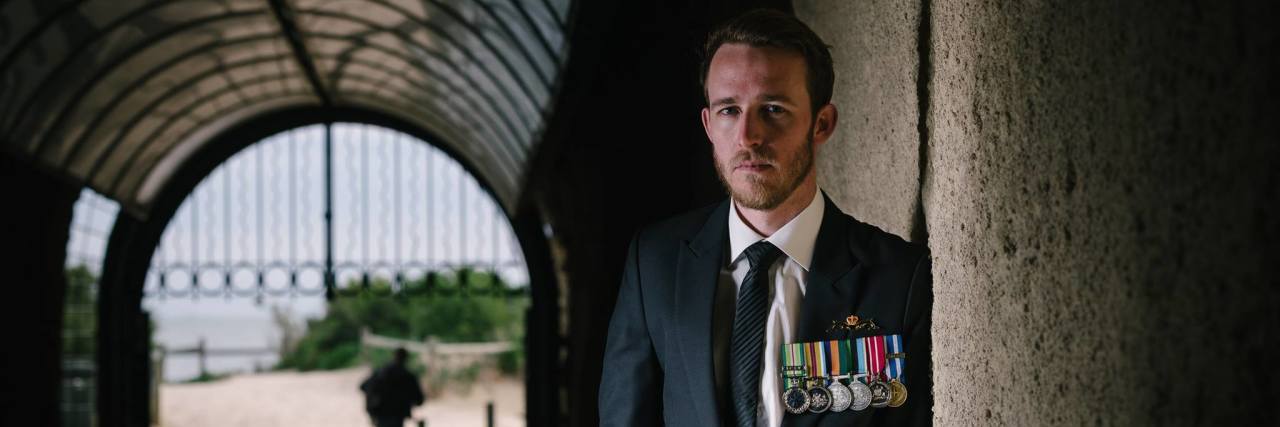The Problem With How the Military Treats Men's Mental Health
Editor's Note
If you experience suicidal thoughts, the following post could be potentially triggering. You can contact the Crisis Text Line by texting “START” to 741741.
What you’re about to read is probably the fourth, fifth, maybe even sixth version of this article that I’ve written. I started with an idea about what I wanted to write about and that subject is the issue of mental health and particularly male suicide. The first few times I wrote a piece I was thinking too hard about it; I had a clear message I wanted to get across and it somehow got lost in all the bullshit. In previous iterations, I got so caught up in trying to say what I wanted that I forgot to actually say it. I wrote with fear, prejudice and worst of all I wrote like a professional.
I spent almost a decade in the military and in that time, you learn things. You learn life skills, how to defend yourself, stand up for yourself in the workplace, you learn how to deal with others and I personally learned how to navigate warships and submarines. The thing is, while you’re off learning all these great new things you’re also learning how to repress your feelings, learning how to fit a mould and learning how to not stand out by any means. I’ve always been a fairly open person; I don’t mind sharing personal stories or embarrassing things I have done and I certainly don’t mind making a fool of myself in front of others. There is, however, one thing that I have never really been comfortable discussing and that’s my own mental health. The fact of the matter is, my view on what men should be like was formed long before I knew I had issues of my own and that makes it hard for me to discuss it now. Men don’t cry, men don’t show weakness and men certainly don’t discuss the issues they’re having. At least, that’s what society had me believe. I’m a pretty sensitive guy, I have a wife that loves me and supports me through anything. She will never judge me and wouldn’t think less of me if I cried but even then, I hold back tears when watching a sad movie. I know it’s a silly to do, but it’s so far ingrained in me that I avoid crying.
Despite this I’m one of the lucky ones because I realize this flaw, I know it’s unhealthy to keep things bottled up and while I still do it with some things, I can be open in others. In the military you don’t talk about your feelings, you don’t show emotion and you certainly don’t admit to having problems, to being “weak” in one way or another. When I finally admitted to myself that I needed to see someone about some of the issues I had been having, I put it off. I tried to tip-toe around it and tried to deal with it as I’ve always dealt with things: internally. For as long as I can remember I’ve had these ticks, I guess you would call them. Certain things I tend to have to do, like blinking my eyes lots or rubbing a certain part of my body or breathing differently. I could never pick what I was going to get myself caught up in but it was always something. The only thing that has never changed is my need (perhaps a desire) to move my fingers and toes constantly. I have always been able to work through it by sheer willpower and for the most part, it’s never been more than one or two things at a time.

As a society, we have a huge issue with male mental health and suicide in particular. Each day approximately seven or eight people in Australia take their own lives and of those a whopping 75 percent are males. The statistics don’t lie and yet they continue at a steady rate; we neither acknowledge nor do anything significant about it. Men are killing themselves in huge numbers (suicide is the leading cause of death in Australian men aged 15-44) and I put it down to our inability to open up and talk to someone about our issues. Society continually tells us that men are buff, strong, unemotional, footy-loving hard men that battle through the issues, it’s the Australian way. When you couple that with the military regime men really don’t have any chance from the outset. In my short Navy career, I personally knew eight people that died by suicide. There were plenty more of course but to personally know eight people who killed themselves is pretty messed up. All of them were young men, with huge potential and seemingly great lives. A lot of them had families, wives, girlfriends and kids yet underneath they weren’t coping and being in the military left them feeling like they had no other choice.
The situation that follows is a prime example of how mental health is treated in the military and is a huge factor, I believe, in why suicide rates are so high.
When I returned from Afghanistan I was thrust back to sea as an addition to a normal crew during a workup program (training then being assessed as competent to be at sea) to get a qualification prior to going on a course. I had booked in for a quick tune up with a psychologist because I was experiencing more ticks at a higher rate and I wanted to get to the root cause. As bad luck would have it a trainee submariner died by suicide at the same time and my best mate (who was part of the crew and quite close to the bloke) was not in a fit state to go to sea. I was asked to fill in his place and I agreed on the proviso that if the program was pushed back a week I wouldn’t be able to go to sea because I needed to deal with my own issues. The Executive Officer (2IC) agreed to this and so we commenced the assessment with me as part of the crew.
When the program inevitably shifted right and I approached the Executive Officer about our agreement he explicitly told me that I 100 percent would be going to sea unless a medical professional told him otherwise. With my hands tied I spoke to the medic onboard to come up with an alternative solution (the reality is that a solution was already in place. The crew had more than enough coverage for me and my best mate not to be at sea). Within half an hour of mentioning mental health and my appointments to see a psychologist, I was whisked up to the doctor’s office, sat down with a doctor, a psychologist and the medic and asked about 40 times if I was going to kill myself, even after I explained I just needed a quick tune-up. I almost wasn’t allowed to go home for the weekend because the doctor seriously considered putting me on suicide watch, despite the fact that I had neither mentioned self-harm nor shown any indication of self-harm.
In the days that followed I was sent to see a psychiatrist, another doctor and a psychologist. The psychiatrist decided it would be best to put me on anti-depression medication (despite being rather happy with where I was at in life). What I didn’t realize at the time was that by going on meds I would be unable to go to sea for at least a year, effectively pushing my career back by at least 12-18 months. Being on meds lasted less than five days after I realized that, even though he had the qualification, the psychiatrist didn’t know me better than I know myself and his plan was the wrong one for me. I took myself off the meds and demanded to see another psychiatrist.
To cut a long story short I was diagnosed with body-focused Tourette’s, ADHD (which actually explained quite a bit) and anxiety. When I eventually went back to the boat to tell my friends and colleagues the reason why I wasn’t sailing with them they immediately changed from laughing and joking to being completely serious and I could tell they were quite uncomfortable and didn’t really know how to act. Despite being exactly the same person I had always been, as soon as I mentioned a mental health disorder it was like a wall went up between me and them.
So going from just needing a quick tune-up, I was asked if I was going to kill myself, put on medication, had my career set back almost two years and had friends and colleagues thinking about who I am as a person in a different way. It’s not hard to see why young men aren’t talking about their issues. I was able to see through the bullshit that I was subjected to and ended up leaving the military but for others, it’s not so easy. Whether they have a mortgage, bills, debts or a family to support, leaving may not be an option. Even not being at sea and losing their seagoing pay may not be an option so they repress their feelings and issues, they try to battle through and ignore them for fear of ruining their careers or having people think differently about them. After a while, it all gets too much and something that could have been treated early has boiled over and it can feel like the only option to them at the time is suicide.
In my experience, just talking to someone about the issues can be the difference between getting better or worse. When I was in the Middle East, I was contacted by a mate and sailor whom I had sailed with the year before who told me that he had tried to kill himself. We spent the next three hours discussing it and talking him back from it. His biggest concern about the whole situation was that he would be taken off sea-pay which he couldn’t afford to do. Had he discussed his issues with anyone other than me, that may have seemed like his only option because of the way the military (and much of society) treats the issue.
There are two things that need to happen. The first is that we need to look at the way we view mental health and need to work past the stigma together. The second thing is that as men, we need to get to a point where we can open up and not bottle emotions. We need to be able to work together to not call a mate a “p***y” or “girl” or any other name that may make them feel inadequate or weak. The ideal that men are strong and don’t show emotion is bullshit and as men, we aren’t really helping ourselves in that regard. If a bloke wants to cry and show his natural emotions then let him. Support him and show him that you don’t think any less of him for being human. As a society, we’ve always seen crying as being weak but in a lot of cases, the opposite is true. Crying may show sadness or happiness and having the ability to let the tears flow without prejudice is strong, it shows compassion and humility and perhaps that’s what we need a bit more of.

From now on I vow to allow myself to cry when I feel the urge. When I watch “Inside Out” again, I’m going to bawl my eyes out, and if you’ve seen that movie, you’ll know exactly what part I’m talking about. Men. Don’t let the ridiculous standards that society places on you stop you from doing what you want, don’t let them stop you from unlocking your emotional side and don’t let anyone tell you that you’re not manly enough to be a man.
Images via contributor

